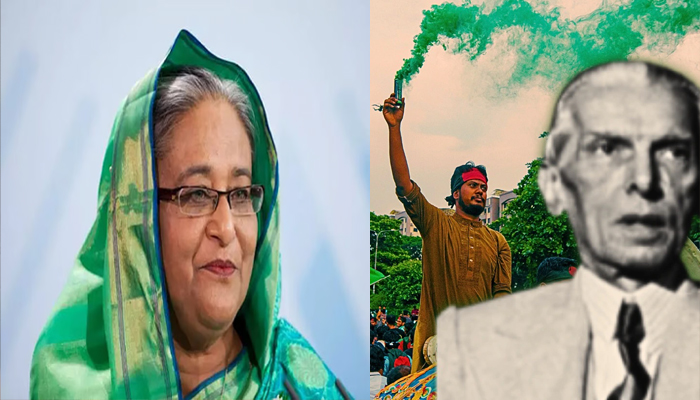In a nation where Bangla was a central pillar of its independence movement against Pakistan.
It came out as an unmissable irony when the 76th anniversary of the death of Muhammad Ali Jinnah, the founder of Pakistan, was celebrated with Urdu poetry and songs in Bangladesh’s Dhaka. This was the first time in Bangladesh’s history that Jinnah’s death anniversary was commemorated in Dhaka. Speakers also said that without Jinnah, Bangladesh wouldn’t exist.
The unusual tribute came on Wednesday, a month after the military-led interim government took over following former PM Sheikh Hasina fled after massive student protests, hijacked by the Pakistan-backed BNP and Jamaat.
While the event marked a rejoice for some, Urdu, Jinnah and Pakistan are still engrained in the bloody memory of the minds of a section of its people.
Some experts saw this as an attempt to rewrite history.
JINNAH COMMEMORATED AT DHAKA PRESS CLUB
The 76th death anniversary of Pakistan founder Muhammad Ali Jinnah was marked at the National Press Club in Dhaka on Wednesday, with a gathering of speakers, Urdu poetry recitations, and musical performances, reported Bangladeshi news outlet Dhaka Tribune.
The event, organised by the Nawab Salimullah Academy at the Tofazzal Hossain Manik Miah Hall, was where several speakers emphasised Jinnah’s crucial role in the creation of Pakistan, stating that without him, “Bangladesh too would not exist.”
While the Pakistani High Commissioner to Bangladesh was expected to attend as the chief guest, he was notably absent. Instead, Deputy High Commissioner Kamran Dhangal represented Pakistan at the event in Bangladesh, where millions were killed, thousands were raped in a Pakistan-devised genocide, until its independence in 1971.
As early as 1952, East Pakistan saw protests advocating for Bangla to be recognised as a co-official language, used in government, education, media, currency, stamps, and to retain its script. The protests saw a heavy-handed crackdown by the West-dominated, Urdu-imposing Pakistani regime.
Dozens were killed in police firing in the pro-Bangla language movement, and five of them have been recognised as martyrs by the Bangladesh government.
On Wednesday, Professor Mostafizur Rahman presented a keynote paper that traced the milestones of Jinnah’s life. Jafarul Haq Jafar, meanwhile, paid tribute by reciting an Urdu poem about Jinnah, and Pakistani students Mohammad Tahir and Kamran Abbas performed Urdu songs dedicated to him. These performances took on added significance in the context of Bangladesh, where the Bengali language once resisted Pakistan’s attempts to impose Urdu as the national language.
The president of the academy, Muhammad Abdul Jabbar, presided over the event, reported Bangladeshi news outlet Dhaka Tribune.
In a controversial statement, Md Samsuddin said that without Pakistan, Bangladesh might have suffered the same fate as Kashmir, with India “holding weapons to our necks.” He credited Jinnah’s efforts for not only the creation of Pakistan but also for enabling Bangladesh’s eventual independence. “If we hadn’t been part of Pakistan in 1947, Bangladesh wouldn’t exist today,” he said, adding that the removal of names of like ‘Allama Iqbal Hall’ or ‘Jinnah Avenue’ in Dhaka University campus, were decisions driven by New Delhi’s interests, not Bangladesh’s own.
A speaker, Nazrul Islam, echoed similar sentiments, saying, “Jinnah is the father of our nation, but we do not acknowledge it. We must preserve our brotherhood with Pakistan.”
POST-HASINA JINNAH TRIBUTE, IS DHAKA REWRITING HISTORY?
The celebration of Jinnah’s legacy in post-Hasina Bangladesh —a nation whose very language was central to its struggle for independence from Pakistan — presents a curious juxtaposition. Moreover, Pakistani misadventures in East Pakistan until 1971, turned out to be the darkest chapter of South Asian history.
Reacting to Jinnah’s remembrance, Dhaka-based journalist Salah Uddin Shoaib Choudhury said, “It was a slap on our war of independence, where 3 million Bengalis sacrificed their lives. I am speechless!” Islamabad-based analyst Ashfaq Hassan asked if Bangladesh was rewriting history.
Sheikh Hasina, who was Bangladesh’s Prime Minister from 2008 to August this year, cracked down on Pakistani and radical Islamist elements during her rule. In her regime lasting 15 years, such elements were sidelined and suppressed, looking to wrestle her out.
The irony of celebrating Jinnah in a nation that fought to free itself from his creation is as striking as it is perplexing. As Bangladesh reflects on its hard-won independence and neighbourhood ties, such tributes raise uncomfortable questions. “Is Bangladesh rewriting its history?” asked the Dhaka-based journalist, Choudhury.

